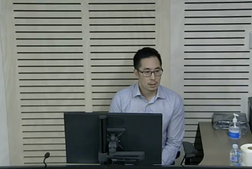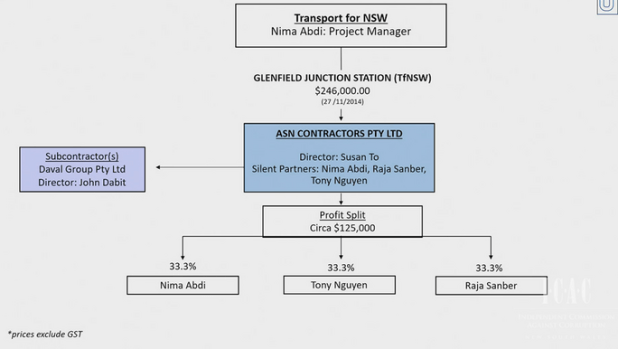A former council employee received kickbacks of up to $70,000, as well as state government contracts for his own company, in exchange for awarding council tenders to mates, the NSW ICAC heard.

The ICAC is enquiring into a tangled web of alleged corruption involving a network of connected companies and state and local government procurement between 2015 and 2020.
Key individuals being investigated include former Leichhardt and Inner West Council employee Tony Nguyen; TfNSW officers Benjamin Vardanega, Nima Abdi and Raja Sanber, and certain employees of NSW government contractor Downer.
In his opening statement on Monday, Counsel Assisting Phillip English said the allegations cover collusive tendering across two government organisations, use of aliases, false references and CVs for fictitious people, conflicts of interest, secondary employment being kept secret, and undisclosed commissions and kickbacks.

Council contracts
The commission heard that during his time as a senior council project officer at Leichhardt and IWC, Mr Nguyen awarded contracts worth more than $4 million for upgrades to parks, ovals and childcare centres to friends and business associates, pocketing between $22,000 and $70,000 in kickbacks.
He also passed on confidential information from competing bidders and submitted dummy quotes to help his mates.
In evidence to the ICAC on Monday, Mr Nguyen acknowledged that he failed to comply with council’s procurement policies and his terms of employment. He also acknowledged he failed to declare conflicts of interest, failed to act honestly and ethically, and took advantage of his position with council to obtain a benefit.
Asked by senior counsel Joanna Davison whether he was aware of Council’s code of conduct Mr Nguyen said: “I was aware there was a code of conduct, yes. But did I read that code of conduct? No I didn’t,” he said.
He also said procurement policies at Inner West were “pretty much all over the place” following amalgamation and “nothing was clear.”
I was aware there was a code of conduct, yes. But did I read that code of conduct? No I didn’t.
Former council employee Tony Nguyen
Mr English said he expected the commission to make findings about the “inappropriateness of the end-to-end control Mr Nguyen had over the procurement and payment processes at Inner West”.
“There were no mandated preferred supplier panels or centralised bidding systems, leaving it open to Mr Nguyen to source, assist and select tendering companies with whom he was assocated,” Mr English said.
“Inadequate supplier due diligence, poor project scoping and management, and a poor control framework that was weakened by organisational change was also causative of the alleged corrupt conduct within Inner West.”
Railway rorting
The commission is also examining procurement processes for multibillion dollar TfNSW railway upgrades using the company Downer EDI Works as a major contractor.
Downer subcontracted much of the work to three companies, including Mr Nguyen’s own company RJS Infrastructure and companies owned by My Nguyen’s friends and associates.
ICAC heard that through these groups, Mr Nguyen partnered with others to tender for civil building and landscaping works at various train stations.
Some $10.3 million was paid to the three companies between 2014-2020 – including while Mr Nguyen was still employed by IWC, the ICAC heard.
None of the companies had any employees, and in most cases they subcontracted the work to other firms, taking a cut of the profit. They also received improper assistance in tendering from TfNSW and Downer, the ICAC heard.
“The types of misconduct … concern collusive tendering, giving and receiving of corrupt commissions or rewards, misconduct in public office, fraud and larceny, and dishonest application of public funds for private advantage,” Mr English said.
Manager told to fix trust issues
When a senior TfNSW project officer expressed concerns about contracts in 2020, he was told he had “trust issues”, the ICAC heard.
In an email, the project officer noted that Downer had awarded projects worth $4.5 million to a company that didn’t have a website and used a residential house as a company address.
I might be feeling paranoid but something seems very odd about this.
Senior TfNSW officer
“Please check if this company is just subcontracting the work out to other firms as it may be an example of pyramid contracting,” he wrote. “I might be feeling paranoid but something seems very odd about this.”
But the ICAC heard that when he voiced his concerns, he was told by a TfNSW manager that he should work on developing trust with Downer.
Inadequate monitoring
Mr English said TfNSW appears to have underestimated the importance of monitoring Downer’s activity.
“This lack of oversight resulted in Downer not being made accountable for compliance with the NSW government code of practice, which in turn created opportunities for alleged corrupt conduct to prosper.”
It may have been because TfNSW’s “risk lense” was focused on construction delivery, rather than corruption, he said.
Whether Downer sought to comply with and enforce these requirements, or simply passed them on to employees and subcontractors without caring for their compliance, is a matter that will be explored over the course of the public inquiry.
Counsel Assisting Phil English
“Whether Downer sought to comply with and enforce these requirements, or simply passed them on to employees and subcontractors without caring for their compliance, is a matter that will be explored over the course of the public inquiry,” he said.
Corruption concerns
Mr English said the alleged corruption was occurring at a time with TfNSW was concerned its large infrastructure program constituted a corruption risk.
In April 2016 a senior TfNSW bureaucrat highlighted in an email to staff that the agency was undergoing a period of accelerated growth and expansion, with a $27 billion infrastructure program.
“Failure to manage potential fraud and corruption risks would seriously damage Infrastructure and Service’s a brand and reputation, and may impede our delivery of works. Therefore we need to be constantly vigilant in our business practices,” the email, read to the commission, said.
The inquiry, before Chief ICAC Commissioner and former NSW MP John Hatzistergos, is expected to run for six weeks.





As Mr Nguyen noted – after the forced amalgamation of the 3 inner west councils, there was very little oversight and this partly explains how the corruption was able to flourish.